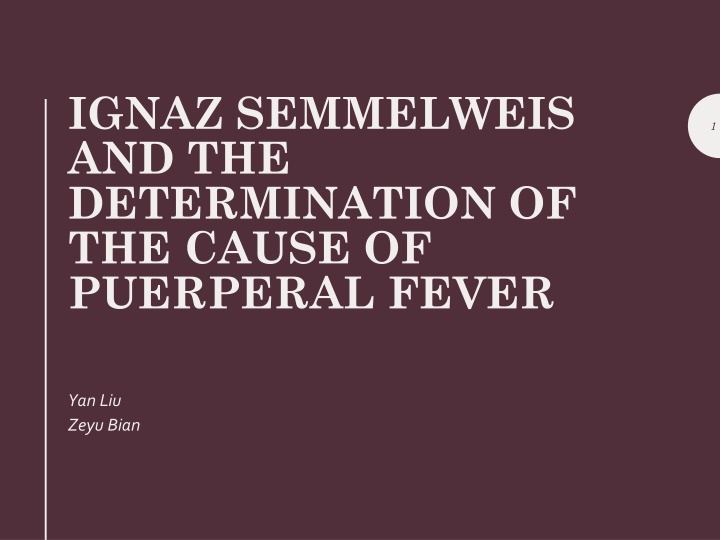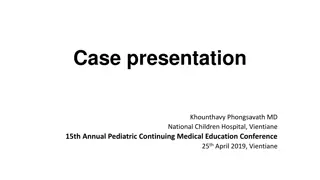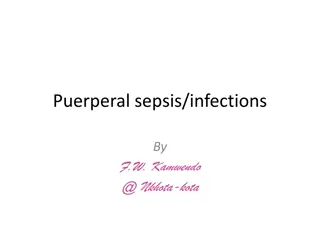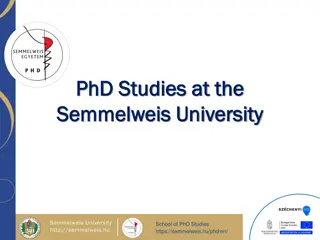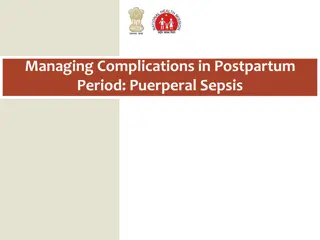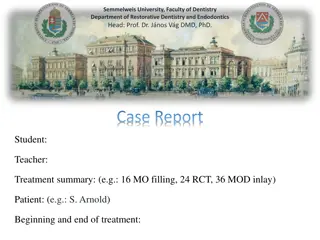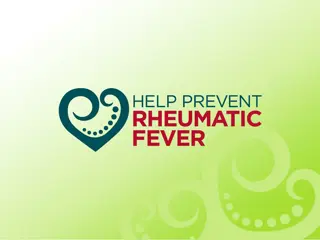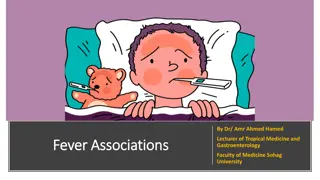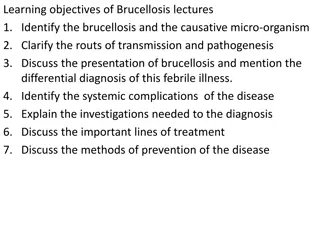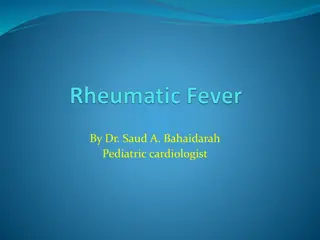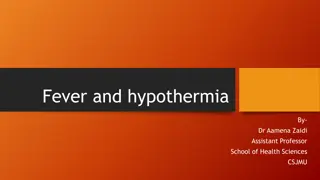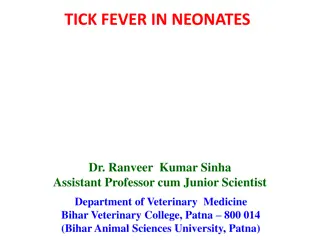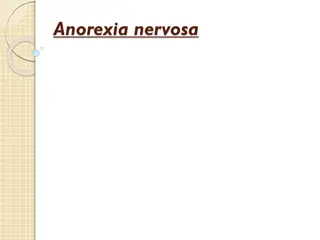Ignaz Semmelweis and the Fight Against Puerperal Fever
Ignaz Semmelweis, a pioneer in antiseptic procedures, determined the cause of puerperal fever in the 19th century. His work led to a significant reduction in maternal mortality by identifying the importance of handwashing in healthcare settings. Puerperal fever, a common cause of death in women after childbirth, is caused by bacterial infections in the female reproductive tract. Recognizing the symptoms and risk factors of puerperal fever, as well as the potential complications like puerperal sepsis, is crucial. Semmelweis's research at the Vienna General Hospital highlighted the significance of hygiene practices in preventing maternal deaths. This historical perspective underscores the importance of evidence-based medicine and the impact of simple interventions on public health outcomes.
Download Presentation

Please find below an Image/Link to download the presentation.
The content on the website is provided AS IS for your information and personal use only. It may not be sold, licensed, or shared on other websites without obtaining consent from the author.If you encounter any issues during the download, it is possible that the publisher has removed the file from their server.
You are allowed to download the files provided on this website for personal or commercial use, subject to the condition that they are used lawfully. All files are the property of their respective owners.
The content on the website is provided AS IS for your information and personal use only. It may not be sold, licensed, or shared on other websites without obtaining consent from the author.
E N D
Presentation Transcript
IGNAZ SEMMELWEIS AND THE DETERMINATION OF THE CAUSE OF PUERPERAL FEVER 1 Yan Liu Zeyu Bian
Ignaz Semmelweis Saviour of mothers An early pioneer of antiseptic procedures Reduced mortality of puerperal fever The first one who really described data as an epidemiologist 2
Puerperal Fever Most common cause of maternal mortality in the 18th centuries Bacterial infections Female reproductive tract After childbirth or miscarriage 3
Puerperal Fever Symptoms: Fever Lower abdominal pain Bad-smelling vaginal discharge Risk factors Multiple vaginal exams Premature rapture of membranes 4
Puerperal Sepsis A potential complication of maternal infections Bacteria invades the bloodstream Cause inflammation of the whole body Meningitis Pleuritis Pericarditis Peritonitis 5
Beta haemolytic streptococcus 6 https://en.wikipedia.org/wiki/File:Streptococcus_pyogenes.jpg
Ignaz Semmelweis Born on July 1, 1818 in Hungary Be awarded doctorate degree in medicine in 1844 Be an assistant in the First Obstetrical Clinic of the Vienna General Hospital on July 1, 1846 8
The Vienna General Hospital ( 1784 ) 9 https://en.wikipedia.org/wiki/File:AAKH-1784.jpg
Two maternity wards In one women were attended to by doctors In the other by midwives Patients were allocated to the clinics on alternate days From 1840-1846 in two clinics 42,795 births 2,977 deaths 10
Table 1 is based on page 356 of the book of Semmelweis: The Etiology, The Concept, and the Prophlaxis of Childbed Fever. 11
Puerperal fever mortality rates for the First and Second Clinics at the Vienna General Hospital 1841 1846. 12 https://en.wikipedia.org/wiki/Ignaz_Semmelweis
The Miasm Theory? Dominant theory to explain the spread of childbed fever in the early 1800s in Europe Simply postulate that disease was carried by the air 13
Semmelweis started a meticulous process of eliminating all possible differences Food Linen Position for delivery Medical attention and treatment 14
Semmelweis wrote: Everything was uncertain, everything was doubtful, everything was inexplicable, only the enormous number of deaths is indubitable fact. Film--Semmelweis https://vimeo.com/177467055 15
Breakthrough In 1847, Dr. Jakob Kolletschka had died His autopsy showed a pathology similar to that of the women who were dying from puerperal fever 16
Revelation Childbed fever wasn't something only women in childbirth got sick from. It was something other people in the hospital could get sick from as well. 17
Hypothesis Connection between cadaveric contamination and puerperal fever Morbid matter on doctors hands Midwives were not engaged in autopsies 18
Test Ordered his medical staff to start cleaning their hands and instruments with a chlorine solution. 19
Mortality rate versus month, before and after intervention 21
Puerperal fever monthly mortality rates for the First Clinic at Vienna Maternity Institution 1841 1849. Rates drop markedly when Semmelweis implemented chlorine hand washing mid-May 1847 22 https://en.wikipedia.org/wiki/Ignaz_Semmelweis
However Doctors were upset Eventually doctors gave up the chlorine hand-washing Semmelweis lost his job 23
Sad ending Semmelweis developed a mental condition over years In 1865, Semmelweis was committed to a mental asylum and died a fortnight later During his lifetime and for many years after his death, he had few supporters, and his work was almost totally forgotten 24
Antisepsis Antisepsis was not introduced routinely into obstetric practice until the 1880s, when the role of bacteria had been discovered and the use of antisepsis in surgery had become firmly established by Joseph Lister 25
Dr. Thomas Roddick A surgeon who visited Lister in 1872 and brought antiseptic practices to Canada The former Dean of Medicine at McGill Roddick s particular contribution is that he was the first in Canada to do antisepsis comprehensively Hand Hygiene https://www.youtube.com/watch?v=i38sgmWrSfo 27
Reference 1. Broemeling, Lyle D. "Studies in the history of probability and statistics: Semmelweis and childbed fever. A statistical analysis 147 years later. 2. Davis, Rebecca. "The Doctor Who Championed Hand-Washing And Briefly Saved Lives."Podcast on NPR Morning Edition (2015). 3. Loudon, Irvine. "Ignaz Phillip Semmelweis' studies of death in childbirth."Journal of the Royal Society of Medicine106.11 (2013): 461-463. 29
